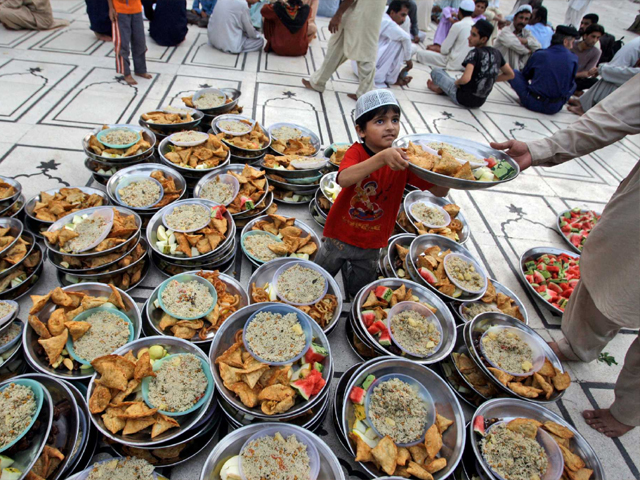
A Pakistani boy distributes plates of food donated to worshippers to break their fast, on the first day of the holy fasting month of Ramazan, in a mosque in Karachi. PHOTO: AP
“Are you a Muslim of Ramazan?”
I immediately asked him, “Do you like Muslims?” He smiled at me and said, “Yes, but the Muslims of Ramazan...
The Holy month of Ramazan has been shadowing the heads of Muslims for a while now. This is the month of spirituality, in which Muslims have the chance to build their characters, renew their faith further, strengthen their relationship with Allah (swt), and truly follow the teachings of their faith.
This month is believed to be the “spring season of good deeds”, for even small deeds done with a good intention carry a lot of weight. This is why during this month, Muslims try their level best to gain more and more rewards.
One can only hope that our good deeds not remain specific to Ramazan only, and that the entire year is spent the way we spend the month of Ramazan. This rude awakening was delivered to me through the most unlikeliest of sources, when about a month ago, a seven-year-old child introduced me to the “season of good deeds”.
It was a very hot day, and as I stood waiting at a bus stop, a little child came up to me in the unbearable heat and asked me for money for food. In a mixed state of anger and irritation, I asked him to forgive me; the same traditional phrase we repeat every time a beggar asks us for money,
“Maaf kardo!”
(Forgive me!)
“Okay let it be, but your God will not forgive you for this,” he replied.
His innocently spoken phrase made me pause, and as the child walked past me, I called him back. Before I could get a word in, however, he asked me,
“Are you a Muslim?”
Embarrassed, I barely moved my head to acknowledge his question and responded in the affirmative. He smiled and said,
“Are you a Muslim of Ramazan?”
Somehow, embarrassment seemed to fill my entire body, and I felt unable to move. When I opened my mouth to enquire what he meant, he explained to me the concept of the “season of good deeds”.
“You Muslims do such good things in Ramazan!”
As he turned to leave, I stopped him once again and asked,
“Are you a Muslim?”
His answer still resounds in my ears.
“I don’t know my religion sister. There is a village behind here where I live with Jagan. Sometimes he gives me food, and sometimes he doesn’t. So I go to the mosque to kill my hunger, since they give out food on a daily basis. But today I can’t manage to reach all the way there.”
There was a deep sadness in his eyes as he paused, and then went on to say,
“I’m very excited that Ramazan will be upon us soon, as in Ramazan we get food on daily basis! Jagan says it is Muslims who come to give us food every day.”
I listened to him silently, and as he stopped speaking, I immediately asked him,
“Do you like Muslims?”
He smiled at me and said,
“Yes, but the Muslims of Ramazan only!”
He took his leave then, but left me in a state of deep shame, regret and sadness. His words began to haunt me – were we all just becoming Muslims for a month?
If not, why we have restricted good deeds only to the holy month of Ramazan, and remain blissfully ignorant for the rest of the year?
Why do we only spare a thought for the poor and the needy during the month of Ramazan?
Why do we not spend the whole year the way we spend this one month?
Why not look after God’s creations for the whole year, the way He looks after us unconditionally?
We continue to remain unaware of the circumstances of the people that surround us. Why are we only choosing to help people on our own terms, when it suits us most?
These are all questions I began to ask myself every day, particularly throughout the month of Ramazan. Am I only being a good Muslim for a month?
Since then I began to try; by doing little things to be a better person in my own individual capacity. I kept wanting to hope that the next time that little child meets meet any one of us, he would say,
“I like Muslims.”
Instead of saying,
“I just like one month Muslims.”
Thus far, I’ve spent this Ramazan trying to change; to be committed and pay attention to God’s command in a way that doesn’t end when the month does. Honouring Ramazan with good deeds is important, but we cannot let this month alone define our actions. It’s time we, as Muslims, realise that our actions are bigger than Ramazan, and this one month alone isn’t enough to compensate for a year of indifference and inaction.

COMMENTS (6)
Comments are moderated and generally will be posted if they are on-topic and not abusive.
For more information, please see our Comments FAQ